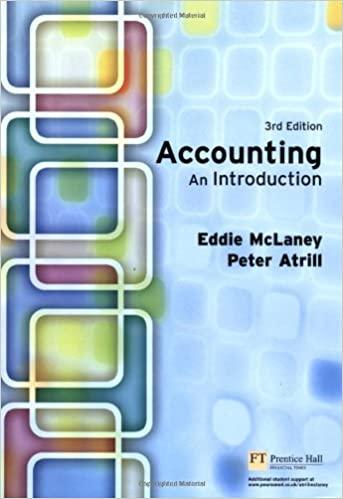Answered step by step
Verified Expert Solution
Question
1 Approved Answer
I es At the beginning of Year 2, the Redd Company had the following balances in its accounts. Cash Inventory Land Common stock Retained earnings
I es At the beginning of Year 2, the Redd Company had the following balances in its accounts. Cash Inventory Land Common stock Retained earnings During Year 2, the company experienced the following events: $17,800 8,000 2,800 17,000 11,600 1. Purchased inventory that cost $12,000 on account from Ross Company under terms 2/10, n/30. The merchandise was delivered FOB shipping point. Freight costs of $880 were paid in cash. 2. Returned $850 of the inventory it had purchased because the inventory was damaged in transit. The seller agreed to pay the return freight cost. 3. Paid the amount due on its account payable to Ross Company within the cash discount period. 4. Sold inventory that had cost $8,500 for $16,500 on account, under terms 2/10, n/45. 5. Received merchandise returned from a customer. The merchandise originally cost $1,600 and was sold to the customer for $2,900 cash. The customer was paid $2,900 cash for the returned merchandise. 6. Delivered goods FOB destination in Event 4. Freight costs of $770 were paid in cash. 7. Collected the amount due on the account receivable within the discount period. B. Sold the land for $5,100. 9. Recognized accrued interest income of $650. 0. Took a physical count indicating that $7,300 of inventory was on hand at the end of the accounting period. Hint: Determine the current balance in the inventory account before calculating the amount of the inventory write down. Required: a. Identify each of these events as asset source (AS), asset use (AU), asset exchange (AE), or claims exchange (CE). Also explain how each event would affect the financial statements by placing a + for increase, - for decrease, and +/- for increase and decrease under each of the components in the following statements model. Assume that the perpetual inventory method is used. When an event has more than one part, use letters to distinguish the effects of each part. The first event is recorded as an example. . Record the events in general journal format. Assume that the perpetual inventory method and gross method is used. c. Post the beginning balances and the events to the T-accounts. Note that these ledger accounts will also be used when posting the closing entry that is created in Part e. d. Prepare a multistep income statement, a statement of changes in stockholders' equity, a balance sheet, and a statement of cash flows for Year 2. e. Use a single general journal entry to close all revenue, gain, and expense accounts to the retained earnings account. Post the journal entry to the ledger accounts and prepare a post-closing trial balance.

Step by Step Solution
There are 3 Steps involved in it
Step: 1

Get Instant Access to Expert-Tailored Solutions
See step-by-step solutions with expert insights and AI powered tools for academic success
Step: 2

Step: 3

Ace Your Homework with AI
Get the answers you need in no time with our AI-driven, step-by-step assistance
Get Started


